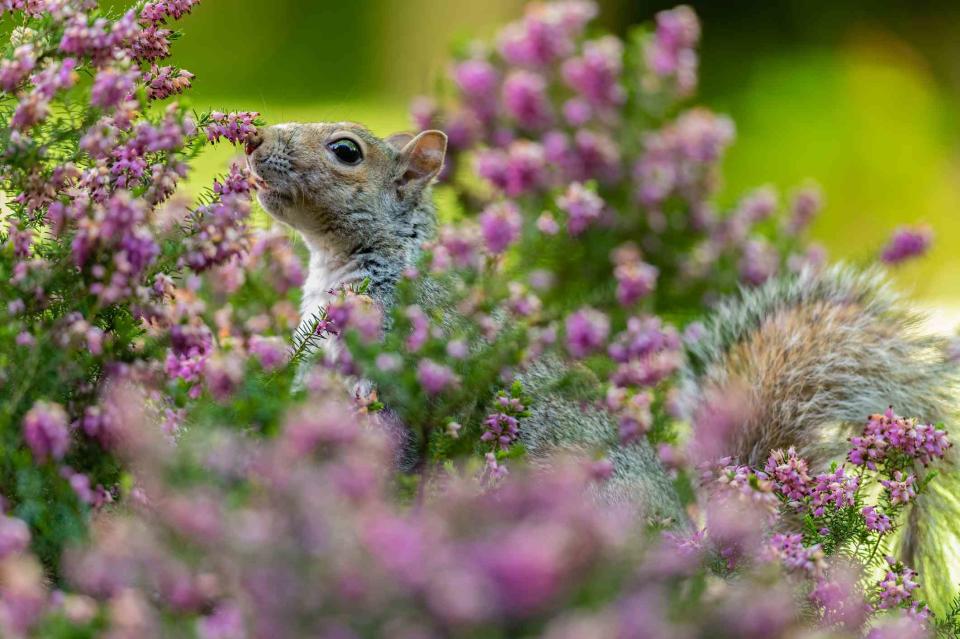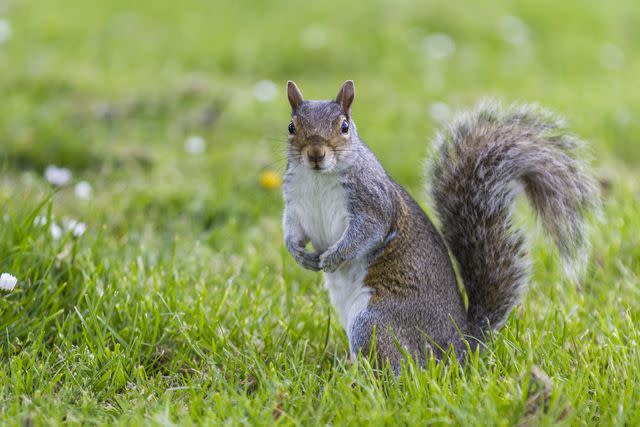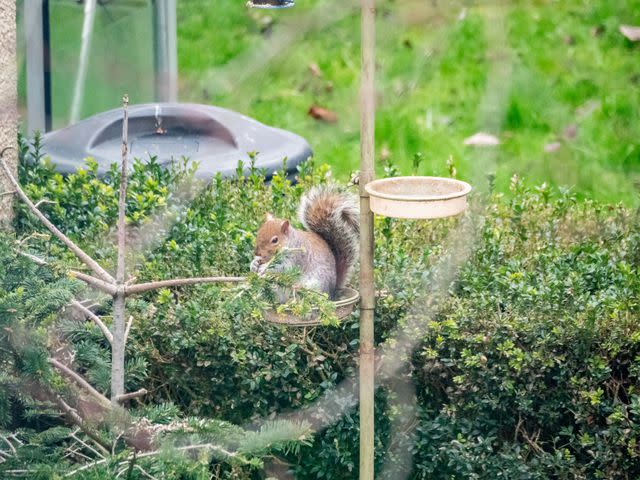How to Get Rid of Squirrels in Your Yard With 9 Simple Methods
It's time to remove these cute but unwanted creatures

Marco Scocco / Getty Images
Squirrels are adorable little creatures small in size with bushy tails, but when they start to dig up your garden or move into your attic, their cuteness is quickly overshadowed by concern.
While a few squirrels in your yard are natural and not a cause for concern, destroyed flower beds, strange sounds from the attic, or scattered droppings are all signs of an infestation.
If you're noticing an abundance of squirrels in your backyard or a few indicators that you might be dealing with an infestation, learn how to get rid of them safely and humanely.
We spoke to three pest control experts for their best tips for removing the problem and knowing when to call in the pros.
Meet the Expert
Blair Calder is the founder and CEO of Automatic Trap Company Inc. in Sonoma, California.
Nicola Carpenter is the president of Black Pest Prevention.
Jamie Nichols is the senior service center manager at Arrow Exterminators.
How to Remove Squirrels from Your Yard

Manoj Shah / Getty Images
Here are nine ways to remove squirrels from your yard DIY-style before considering calling in the experts.
Eliminate Food Sources
The first place to start is by removing food sources from your yard, including low-hanging bird feeders, nuts, seeds, and discarded foods.
"Usually the best way to get rid of squirrels is to remove the food source or stop feeding them," Calder says. "Even If your bird feeder is 100% squirrel-proof, the birds usually make a mess of the seeds and the squirrel will forage for food underneath."
Plant Repelling Flowers
Believe it or not, there are a few flowers you can plant in your garden that act as a natural repellent to keep squirrels away. Plants like daffodils, hyacinths, and marigolds are flowers that deter squirrels because of their bright flowers, taste, and smells that squirrels don't like.
Use Squirrel Repellent
Squirrel repellents are another humane option to spray around the yard to deter these rodents from digging it up. These repellents produce a strong smell and unpleasant taste for squirrels that keep them from digging the garden or chewing on what you spray.
Trap and Remove Them
Using traps to catch the squirrels and relocate them is perfectly okay with the humane methods that act as a cage instead of hurting the little creature. Set these traps up around your yard with bait like nuts, apples, or fruits to catch the squirrels and move to another location five to ten miles away from your home.
Let Dogs Roam
If you have dogs, letting them roam in the yard can be an excellent deterrent for keeping squirrels at bay. Squirrels are afraid of dogs, especially the big, aggressive ones, which means these rodents shouldn't be a problem when your pooch is roaming free.
Utilize Chemical Repellent
Though they include chemical ingredients, these products can be extremely effective at preventing the infestation since they're very irritant for these creatures.
Warning
When using chemical repellents, read the packaging to note the specific ingredients in the formula and possible side effects of coming into contact with the repellent.
Put Up a Fence
Though a backyard fence won't keep squirrels out of your yard, plastic fencing around your garden should do the job. Plastic netting or metal fencing around individual plants or a small garden area is very proactive at keeping squirrels away.
Keep Trash Closed
The outdoor trash can be another source for food that needs to be sealed tightly and moved indoors to prevent squirrels from scrounging in the bins.
"It’s important to have airtight garbage bins, or, even better, secure them with locking lids," Carpenter recommends. "Squirrels have a highly developed sense of smell, excellent vision, and such a remarkable ability as spatial memory. If they visited your yard once and liked it, they will come back."
Trim Trees and Shrubs
Eliminating squirrels from your yard could be quite the task, depending on your surroundings.
A good starting point is to eliminate food sources and thinning trees and limbs outside, Nichols says. Ensure all tree limbs are trimmed at least 10 feet away from your home—this will help keep them off and away from your home.
5 Signs of a Squirrel Infestation

Darren Lehane / Getty Images
Here are five common signs you have a squirrel infestation in your home or around the yard—you might have already spotted these, and we're here to confirm you could have a squirrel problem..
Scratching or Scurrying Sounds
Hearing strange sounds in your home? You're not going crazy. If you've been hearing scratching or scurrying sounds at night, odds are you've got a couple of squirrel roommates.
"You'll hear them in the attic or walls—they make a racket when they are hiding food or making a nest and this is usually very aggressive scratching noises," Blair Calder of Automatic Trap Company Inc. says.
According to Nicola Carpenter of Black Pest Prevention, listening for sounds in the darker hours is key to knowing if the squirrels have made their way inside. You’ll know it’s a squirrel if the noise intensifies at dawn or dusk.
Droppings Around the Yard
If the sight of countless droppings is making you raise your eyebrows, it's likely because of the rodents that are running amuck around your yard. Homeowners should also be aware of squirrel droppings, similar to rodent droppings but a bit bigger and darker.
Half-Eaten Fruit
Squirrels are always on the hunt for their next meal and are attracted to food sources homeowners may have around the yard. If you have fruit trees or bushes, you may notice discarded half-eaten pieces of fruit from your plants lying around the yard, which are indicative of a squirrel infestation.
Dug-Up Garden
Burrowing is part of a squirrel's survival method, whether to dig for shelter or food storage. Sadly, holes in the garden or yard are other signs of an infestation, which can be insanely frustrating after the hours you put into your landscape,
Tipped-Over Trash
Unlike raccoons, squirrels don't typically dumpster-dive unless they scent attractive food sources. If you have something they like in your outdoor garbage bins, tipped-over trash, chewed-up bins, or scattered trash are signs more squirrels are hanging around and enjoying your surroundings.
How Much Does It Cost to Remove Squirrels?
If you've tried several of these methods to no avail, there's nothing wrong with calling in the professionals. "The quicker you take action, the less damage," Carpenter says. "It's important to call a professional, as squirrels can chew on wires and damage the structure of your buildings."
The national average for removing squirrels from your yard with a professional is around $350. The exact cost for your squirrel infestation removal depends on how big of an infestation your professional is dealing with and their labor costs, on top of possible repairs that will need to be made to your home.
How to Keep Squirrels from Becoming a Problem
Preventative maintenance is key to keeping squirrel problems from occurring in the first place. Though it's not possible to completely keep squirrels from entering your yard, you can do things to keep them from taking up residence.
The best ways to keep squirrels from becoming a problem is by removing food sources from your yard and keeping your trash tightly sealed or in an interior space like a garage.
The best way to keep squirrels from entering your home is to seal gaps or holes they're crawling into. Having a professional pest control expert observe your home for possible entrances could be a good idea for finding spots you need to seal.
Frequently Asked Questions
How do I get rid of squirrels ASAP?
The fastest way to get rid of squirrels is to remove what they're attracted to around your yard, whether that's trash or another food source. Then use safe repellent sprays or plants they hate to keep them from wanting to come back in the yard.
What can I put in my yard to keep squirrels away?
Peppermint, garlic, cinnamon, and cayenne pepper are all scents squirrels hate. Planing peppermint plants, garlic, and bright florals like daffodils and marigolds are options to keep squirrels away from their bright colors and unpalatable taste and odor.
What do squirrels hate most?
Squirrels hate tastes and smells that are strong, sweet, and spicy. Peppermint, cinnamon, and garlic are all scents and tastes these rodents don't like and make great natural repellent for keeping them away.
Read the original article on The Spruce.

